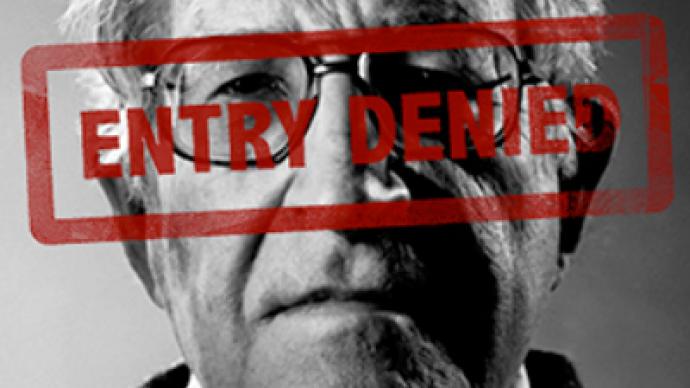Noam Chomsky denied entry at Israeli border

American academician Noam Chomsky had some choice words for the Israeli government after he was denied entry into the West Bank.
Chomsky, 81, had been scheduled to deliver a lecture on Sunday at Bir Zeit University near Ramallah, as well as meet with Palestinian Prime Minister Salam Fayyad. But those plans were dashed when Israeli officials turned him back at the entry point at the Allenby Bridge, the entrance point from Jordan to Jericho in the West Bank.
Since 1967, the West Bank has been under Israeli military control.
Chomsky told Haaretz, the Israeli daily, about the questions he received at the border.
“The official asked me why I was lecturing only at Bir Zeit and not an Israeli university,” Chomsky recalled. “I told him that I have lectured a great deal in Israel. The official read the following statement: ‘Israel does not like what you say’.”
To this, he replied: “Find one government in the world which does.”
The official then asked Chomsky, who is Jewish, why he did not have an Israeli passport.
“I replied I am an American citizen,” Chomsky said.
The American political activist, who is also a renowned linguist at the Massachusetts Institute of Technology (MIT), told Haaretz that he supports a two-state solution to the Israeli-Palestinian crisis, but not the solution proposed by Jerusalem, which will amount to “pieces of land that will be called a state.”
He said that Israel's behavior today reminds him of that of South Africa in the 1960s, when it understood that it was already suffering international scorn, but thought that it would “resolve the problem with better public relations.”
“I was against a boycott of apartheid South Africa as well. If we are going to boycott, why not the United States, whose record is even worse? I'm in favor of boycotting American companies which collaborate with the occupation,” he said. “But if we are to boycott Tel Aviv University, why not MIT?”
After hours of questioning by Israeli officials, Chomsky’s passport was stamped “Entry Denied”, and he was forced to return to the Jordanian capital of Amman.
Chomsky rejection “an error”
Israel's Interior Ministry said on Monday that Chomsky's entry denial had been made in error; the case should have been handled by a special Israeli body responsible for coordinating activities in the Occupied Territories.
“Because he entered the Palestinian territories only, his entry is the responsibility of the coordinator of Government Activities in the Territories,” Interior Ministry spokeswoman Sabine Hadaad said, adding the case would be reviewed. “There was a misunderstanding on our side.”
There were no reports whether Chomsky would make another attempt to gain access to the occupied territories.
Meanwhile, the embarrassing incident has sparked heated debate in the Israeli media.
“Nobody in his right mind can claim that Chomsky represents a security threat to Israel,” wrote Carlo Strenger for Haaretz. “He’s 81 years old. He is not a specialist on armed insurrection, and he has never called for violence against Israel.
“If Israel feels it can defend its actions morally and politically, it should not fear thinkers who criticize it. But Israel is beginning to tamper with free speech, and this is a truly worrying development.”
In Yedioth Aharanot, a popular daily, Boaz Okon wrote, “It would not be an exaggeration to say that the decision to shut up Professor Chomsky is an attempt to put an end to freedom in the State of Israel.”
But unfortunately for Israel, it is Chomsky, the fierce foreign policy critic, who hashed out the hardest accusations.
“I find it hard to think of a similar case, in which entry to a person is denied because he is not lecturing in Tel Aviv. Perhaps only in Stalinist regimes,” Chomsky told Haaretz, in what would certainly not be his last word on his rejection.












